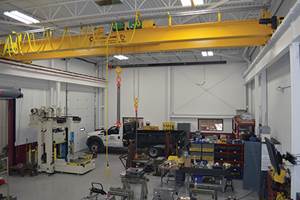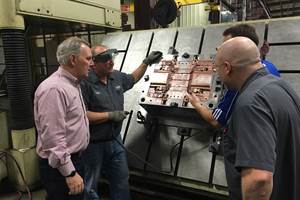The Internet: Changing How the Metalworking Business Does Business
Despite the current financial machinations of dot.com companies, the Internet is a vital factor in how business does business. And metalworking companies are no differen
Regardless of the industry, the very simple fact is that the PC sits on the desktop of every business decision-maker in every industry. That window is the fundamental opportunity the Internet provides for all businesses, especially those in metalworking.
There is no more valuable piece of real estate in terms of getting in front of the customer or prospect than getting into that PC. The Internet gives the metalworking company a cost-effective way to do that. It has been seen that business buyers are motivated to find information that allows them to do their jobs better and to become more efficient, effective and productive. They want to make better decisions about the products and services that they're buying for their companies. So, they're naturally motivated to seek out that information through quick and accurate sources. And where do they turn? They increasingly turn to the Internet.
Research in all areas supports that there is an increase in people using the Internet to uncover information on all products and services before they buy, including those offered by metalworking companies. There is going to be a point at which the Web will be the place where people turn to first and most often for information about metalworking - even above and beyond the sales rep, which is the current number-one source for that information.
Product-Focused Site
When researching and studying business markets and processes, it becomes clear that "industrial specifiers," including all types of professionals with purchasing and decision-making responsibility, consistently expect the same information from vendor, outsourcer or OEM supplier - a clear access to and understanding of a company's product and service capabilities.
That remains the number one reason that people come to a manufacturer's website, which is especially true in this industry. They expect to find a depth of information that is required for them to make the proper decisions about buying a product or service.
They can acquire this decision-making information anonymously via the Web in a way that is more convenient for them and is less time- and cost-consuming than a sales call. The result of this analysis for the metalworking company is a more highly qualified lead, which tends to generate a higher percentage of leads-to-sales. The lead knows a lot about your products and services, and they're asking very specific questions about your business capabilities.
As a result, the ability to close the sale is greatly enhanced via the Web. The timeframe in which sales are closed could be very short because of the quality of the generated lead, which allows for expedient two-way communication, information and decisions.
If you don't meet their expectations, or you provide inferior support to those expectations, their perception of your company is greatly diminished. If all you do is put out product and service information and perhaps some pricing information, which is the other thing that buyers like to see on websites, you quickly commoditize your entire company and the entire metalworking industry.
The ability of the user to go from one metalworking website to another makes it easy to compare specs and pricing. To avoid losing your niche in the marketplace, you must emphasize your brand status to ensure that you are not judged against your competitors based solely on product and service information specs, which may place too much weight on bottom-line pricing.
Sites Build Relationships and Differentiate
To meet that basic user expectation for product support and service information in the metalworking business, you must provide a reason for customers to do business with your company. Having your customers merely buy the products and services that you provide is simply not enough. You need to actually form and develop a relationship between your company and your customers. That is all about building a brand and creating a brand value that extends beyond the attributes that your products and services will offer. If you do that successfully, not only do you meet user expectations for basic product information and services in the metalworking marketplace, but you also demonstrate why you are the company with which they should do business - you versus some other company that provides the exact same products and services in metalworking. That is the way you can counter the commoditization aspect of the Internet and the free flow of this information.
However, be cautious. As much as the Internet can do, there are certain things it cannot do for the metalworking field. It can't replace the real world aspects of selling and marketing. It isn't going to completely replace any of the real world aspects of things going to market. The Internet enhances and supplements. It is an additional channel of communication and contact with customers and prospects. It should never be looked at as something that would totally replace another channel that's currently in place.
A virtual world with an Internet-only play isn't necessarily going to make it. But when the brick and mortar business goes online - and does a good job of selling to prospects and serving customers through the Internet - it is ultimately the winner. It does that by leveraging its existing real world assets, including its customer relationships, its physical locations and its distribution processes and networks.
Define Your Brand and Offer a Good Choice
With the technology and the enhanced skill base in our technological world, there are a number of people who can build your company a website. However, it is dangerous for your company to let just anyone present your business image.
Current desktop software gives many people the ability to create and print flyers and brochures, but a sophisticated communications society such as ours expects a professional message presentation. You don't want just anyone presenting your image to your customer.
In an era of communications bombardment in our daily personal and business lives, the need to finely craft the right message for the right audience is becoming increasingly important. If someone doesn't know how to do that properly, or if they're not skilled in the ways of communicating with your particular audience and in understanding what that audience's needs are, the customer may never be able to discover how your product or offering fits in with their needs.
A poorly crafted message also may create more long-term damage than it may gain through short-term savings of time and money. On your website, such damage may be even more significant. You are now publishing that message and image to the entire world.
For a metalworking company that has never been on the Web, the first thing it should do is fully understand its brand's value. Being able to describe and assemble the information that clearly defines your offerings and the attributes of your products and services is key. Find a professional organization that can help you put that online, keeping in mind that the Internet does have and is quickly emerging with a set of basic principles and rules about how you present information to users.
One of the other rules that is interesting about a website versus other marketing communications vehicles is that the user chooses to come to the website. In the case of the Internet, they are seeking you out. They have chosen you.
They have clicked on the Internet and your website either through the search engine or they are aware of your URL and they've typed it in. They have decided to come to your site. They are in control, and, as a result, you have to precisely meet their needs and make it as easy as possible for them to find the thing for which they're looking.
Online Customer Collaboration
For metalworking companies, there are fundamental questions that must be answered before the process starts. Do they want to use their websites purely as prospecting tools or do they also want to use them as customer retention tools? All company websites start out as marketing communications tools for the purpose of attracting new customers and generating leads. That is a solid foundation for why you should create a website, and what the website should be doing.
Additionally, however, you need to look at whether or not the Internet can assist you in developing a stronger relationship with your current customer base by providing them with access to information about their particular project, machine or part. How can a customer view the project, and review change orders as well as the final preproduction part without visiting your plant? Do your customers and prospects have the ability to look at their job orders and products, some of which they've bought from you over a period of time?
Can you make it easy for a customer to analyze that information via the Internet to drive out production costs? Can you feed back to them, via a dedicated and protected website, information that will help them do a better job of regulating their inventory? Can you allow them access to your operation to review and change job and project specifications while it is still in progress? There are many ways that the Internet can do more than just sell to prospects. It also can strengthen the relationship of an existing customer base.
Regarding hardware and software expenditures, you don't need to spend a lot of money or hire a huge staff, but you can certainly outsource all of this. There's no reason for you to have to make a major investment, particularly as it relates to creating your website and hosting it.
Many internal departments prefer to maintain those servers, and certainly as they start to distribute customer-specific information that ties to the legacy systems, there are issues of security, but, for the most part, many metalworking companies, particularly smaller ones that don't have the significant internal investment already, don't need to create one just to do an effective job of using the Internet to promote and build relationships.
In regard to the good news and the bad news for metalworking companies related to the Internet and Web services, there is a little of both. The good news is that the Internet continues to demonstrate that it is a cost-effective way of communicating with prospects and customers. Because of its unlimited boundaries, it provides a global base for the individual organization that might otherwise have been restricted to marketing within the small and specific region. It provides opportunities to market into new industries and into new geographic markets that may have previously been impossible.
The bad news is that there is an abundance of information out there. And the opportunity for other companies to come into your market is going to potentially make for an even more competitive industry than that in which you currently operate. If you're not doing an effective job of meeting customer and prospect needs, you're more likely to lose business to competitors you've never heard of before.
Related Content
The Trifecta of Competitive Toolmaking
Process, technology and people form the foundations of the business philosophy in place at Eifel Mold & Engineering.
Read MoreOEE Monitoring System Addresses Root Cause of Machine Downtime
Unique sensor and patent-pending algorithm of the Amper machine analytics system measures current draw to quickly and inexpensively inform manufacturers which machines are down and why.
Read MoreMaking Mentoring Work | MMT Chat Part 2
Three of the TK Mold and Engineering team in Romeo, Michigan join me for Part 2 of this MMT Chat on mentorship by sharing how the AMBA’s Meet a Mentor Program works, lessons learned (and applied) and the way your shop can join this effort.
Read MoreThe Critical Role of Management Representatives in ISO 9001
In ISO 9001 quality management systems, the Management Representative (MR) plays a crucial role. While the 2015 version of ISO 9001 no longer mandates this position, having a trusted management member serve as an MR remains vital for streamlining operations and maintaining quality standards.
Read MoreRead Next
Bringing The Internet To The Machine Tool
The Internet integrates the factory floor with customers and suppliers, allowing true Enterprise Production Management. The concept of "virtual product" replaces the conventional practice of warehousing inventory.
Read MoreReasons to Use Fiber Lasers for Mold Cleaning
Fiber lasers offer a simplicity, speed, control and portability, minimizing mold cleaning risks.
Read MoreAre You a Moldmaker Considering 3D Printing? Consider the 3D Printing Workshop at NPE2024
Presentations will cover 3D printing for mold tooling, material innovation, product development, bridge production and full-scale, high-volume additive manufacturing.
Read More
















